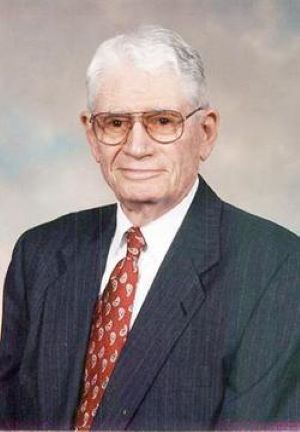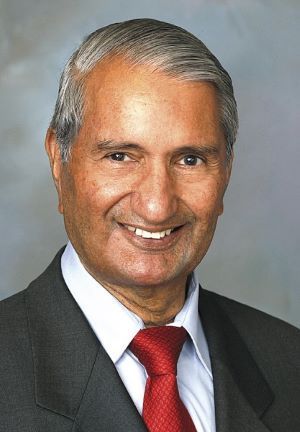

Henry M. Beachell and
Dr. Gurdev Singh Khush
UNITED STATES, INDIA
The 1996 World Food Prize was awarded to Dr. Henry M Beachell and Dr. Gurdev Singh Kush for their advances in rice breeding, which contributed to ensuring that growing populations in Asia and around the world would be supported by sufficient food supplies.
Full Biography
Recipients' Background
That plant, the hybrid product of a cross between a short, stiff-strawed variety from Taiwan and a taller, pest-resistant variety from Indonesia, was tagged IR8. The variety – responsive to fertilizers, markedly more resistant to pests, and structurally suited for bearing heavier grain mass – later became better known worldwide as “miracle rice.” In test plots across Asia, it more than doubled the 1 or 2 ton per hectare yields of traditional rice varieties, in some places setting records ranging from 6 to 10 tons per hectare. With good management on irrigated land, the average Asian rice farmer using IR8 would produce four or five tons per hectare.
IR8 and other higher-yielding rice varieties were soon feeding people across Asia, where high population growth rates had been causing malnourishment and starvation and forcing Asian countries to purchase imported food. Dr. Beachell’s skill and accomplishments more than doubled production rates, allowing Asia’s farmers to feed their families as well as their fellow citizens; additionally, incomes in rural and poor areas increased and nutrition improved dramatically.
Dr. Beachell noted certain flaws in IR8: a low resistance to certain pests and diseases and cooking qualities that some rice-eater populations considered inferior. From IR8’s genetic base, Dr. Beachell continued to look for improvements to the variety and trained a number of younger colleagues in the same task. In 1976, one of his colleagues, Dr. Khush, succeeded in spectacular fashion.
Cross-breeding IR8 with 13 parent varieties from six nations, Dr. Khush developed IR36, a semi-dwarf variety that proved highly resistant to a number of the major insect pests and diseases that drove down farmers’ rice yields and raised prices of the staple food for Asian families. IR36 matures rapidly – 105 days compared to 130 days for IR8 and 150-170 days for traditional types – and produces the slender grain preferred in many countries. The combination of these characteristics soon made IR36 one of the most widely planted food crop varieties the world has ever known. About 11 million hectares were planted with IR36 worldwide in the 1980s, a success which Dr. Khush topped with IR64 and again with IR72 in 1990.
Henry M. Beachell
Henry “Hank” Beachell was born September 21, 1906, in a family of Nebraska wheat farmers. While studying for his 1930 bachelor’s degree at the University of Nebraska, and later for his 1934 master’s in plant breeding and genetics at Kansas State University, he envisioned himself breeding improved strains of wheat. Then he was hired as a United States Department of Agriculture rice researcher – which changed not only his career path, but the lives of several billion people who have benefited from the high-yielding “miracle rice” he developed in the 1960s.
Before this breakthrough, for which he shared the 1996 World Food Prize with Dr. Gurdev S. Khush, he was instrumental in advancing and supporting rice production and research in America. While working at USDA from 1931 to 1963, he developed nine higher-yielding rice varieties that made up 85 percent of the rice grown in the United States for over 15 years. He also helped form the Texas Rice Improvement Association, a private source of funding intended to sustain rice research at Texas A&M University.
After retiring from USDA, Dr. Beachell went to work for fellow World Food Prize Laureate Dr. Robert Chandler at the International Rice Research Institute in the Philippines. It was there in 1966 that Beachell produced the groundbreaking IR8 variety, which he continued to research and improve throughout his career.
Dr. Beachell was also a committed and effective mentor to a generation of leading scientists who continued to work with IR8 and other varieties after Dr. Beachell left the Philippines in 1972 for an IRRI station in Indonesia. After his decade of work there, Indonesian rice productivity jumped by 100 percent. Dr. Beachell also consulted with RiceTec, Inc., and in 1997, over sixty years after his career began, he worked with Cornell University and USDA researchers to establish a genetic seed bank for rice cultivars. His legacy continues to be felt through the numerous scholarships he established at the University of Nebraska, Kansas State University, and Texas A&M University with the money of the World Food Prize.
Dr. Beachell was honored by the government of Korea in 1978 and that of Japan in 1987. He received the John Scott Medal and the Premium Medal of the City of Philadelphia in 1969, the IRRI Award in 1972, and the Kansas State Medallion Award in 1998. He was awarded honorary doctorates from the University of Nebraska and Seoul National University.
Billions of people are now better fed, enjoy better health, and have increased life expectancy, thanks to Dr. Beachell and his exemplary efforts in rice breeding.
Dr. Beachell passed away on December 13, 2006 at his home in Alvin, Texas. He was 100 years old.
Dr. Gurdev Khush
Dr. Gurdev Khush is a world renowned geneticist and is considered one of the heroes of the Green Revolution for his leadership in developing rice strains that enhanced the quality and quantity of the rice supply in countries facing unprecedented population growth. He shared the 1996 World Food Prize with his mentor, Dr. Henry Beachell, for their unparalleled achievements in enlarging and improving the supply of rice, one of the world’s largest food crops.
The trail of Dr. Khush’s remarkable career began on a wheat farm in northern India, where his father instilled in him the value of education. After graduating from Punjab Agricultural University in 1955, he traveled to England and worked in a factory to save enough money for travel to the United States. In 1957, he applied to and was accepted by the University of California at Davis, where he studied with two legendary plant geneticists—Ledyard Stebbins and Charles Rick. After receiving his doctoral degree in 1960, he studied the tomato genome with Dr. Rick for seven years.
In 1967, IRRI recruited Dr. Khush to develop high-yielding rice varieties with short growth duration, resistance to diseases and insects, and superior grain quality. In less than five years, he became head of IRRI's plant breeding department and was well on his way to developing his own new varieties of "miracle rice" based on Dr. Beachell’s IR8. The resulting 300-plus improved varieties were distributed to rice-growing countries in Asia, Africa, and Latin America. World rice production increased from 257 million tons in 1966 to 686 million tons by 2010, a Green Revolution that feeds more than a billion people every year. One of these varieties, IR36, is the most widely planted food crop ever grown.
Dr. Khush retired from IRRI in 2002, and returned to UC-Davis as an adjunct professor to share his knowledge and experience with students and faculty.
Dr. Khush has received honorary doctorates and degrees from twelve universities, including a 2000 doctorate from Cambridge university and a 2006 doctorate from Ohio State University. In 2007, Dr. Khush was awarded the Golden Sickle Award, honoring researchers who have made a considerable contribution or accomplishment in rice research. In addition, Dr. Khush received the Borlaug Award in 1977, the Japan Prize in 1987, the 2000 Wolf Prize in Agriculture, the 2001 International Scientific and Technological Cooperation Award from the Government of China, the Padma Shri award from president of India in 2001, and the Mahathir Science Award in 2009.
He has been elected to the US National Academy of Sciences, the Russian Academy of Agricultural Sciences and Chinese Academy of Science, the Royal Society of London, and he consults for over 15 national governments, including India, China, and Russia. Dr. Khush is the author of three books, and more than 80 book chapters and 160 scientific papers.
Dr. Ron Cantrell, former Director of the International Rice Research Institute, has said that “While Dr. Khush’s name has passed the lips of many, his life’s work has passed lips of almost half of humanity.” The 1987 World Food Prize Laureate M.S. Swaminathan has paid tribute to Dr. Khush, noting that “He combines remarkable capacities in both theoretical and practical work, and is a role model for all young scientists.”


